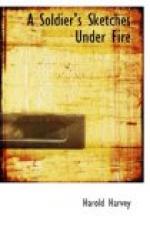[Illustration: “Doomsday book”: A French lesson in A cattle truck.]
Our corporal (behold him with an open book of Family Bible dimensions) often busied himself with expounding his views on the French language, in which he was labouring to become proficient. His linguistic ambitions did not end at self-proficiency, for he was solicitous to instruct his fellows, and we had quite a number of French lessons from him, although it must be admitted that they suffered many interruptions in good old plain English from the Tommies, provoked by the jolting of the train. They nicknamed this huge French dictionary the “Doomsday Book,” because it was their doom to have its contents thrown at them every day.
THE LAST STAGE.
The weather set in very cold and snowy, and as the cracks in the bottom of the truck measured three inches in width, it can be guessed what a draught there was. But in spite of everything and the general discomfort of things, jam and biscuits were “lowered” in plenty. I amused the boys by making sketches on biscuits and throwing them out of the window at the various stations we passed through to the crowds of French civilians, soldiers, and Red Cross nurses. Perhaps some of my comrades will find some of these biscuit souvenirs at their homes—if they ever get there—for not a few were kept to the end of the journey and posted to friends in England.
We passed over several bridges which the Germans had destroyed, but which had been made temporarily good again by the French engineers. Over these our train had to travel gingerly. As we neared the fighting zone the booming of the guns could be heard, and a little further on things became more warlike. We noticed the devastated stations, villages, and large shell holes in the embankment of the line.
All this seemed to bring to the surface our fighting spirits, and we only wanted to be out and at the Huns.
On arrival at Etaples, after a rest of two hours or so in the station yard and street adjoining same, we marched in full pack and kit, including blankets and our waterproof sheets, to a fishing village, where we struck a camp and turned in for the night. We were under canvas for four days—the only four days under canvas during the whole time I was in France. The Colonel gave orders that all the men’s heads were to be shaved, as we were proceeding to the trenches.
LADY ANGELA FORBES’S SOLDIERS’ HOME AT ETAPLES.
[Illustration: Lady Angela FORBES’S soldiers’ home at Etaples.]
A never fading recollection of Etaples will be that of the kindness and hospitality we received at the hands of Lady Angela Forbes and the “very gallant gentlewomen” who assisted her in the management of her Soldiers’ Home there. The warmest of welcomes and the best of cheer awaited every soldier who crossed its threshold. Nothing that thoughtfulness could suggest and liberality could provide was lacking. Tact and an understanding sympathy characterised the administration of every department. We left behind us blessings and thanks we could not express in words.




